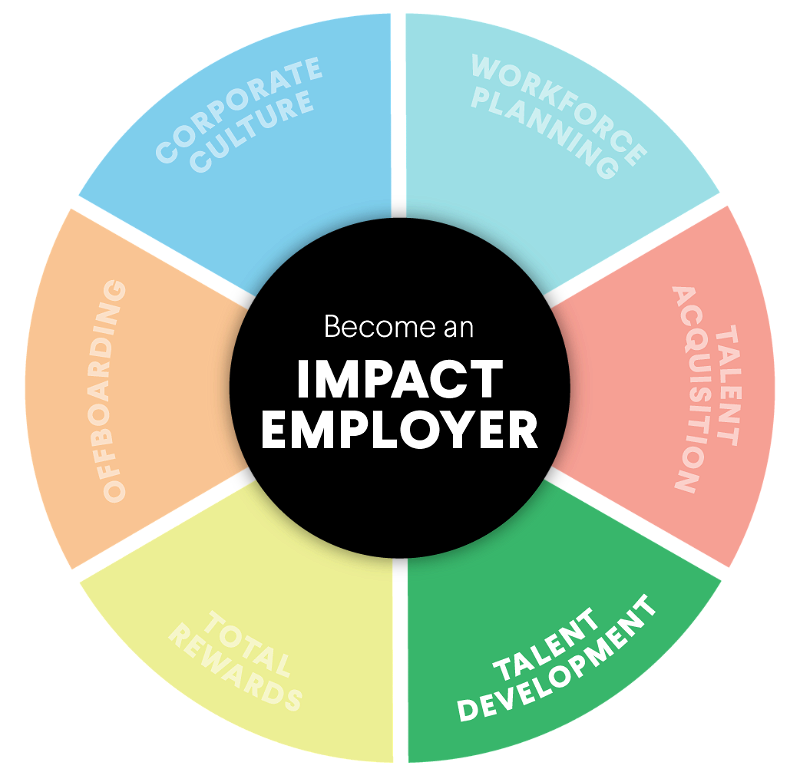
Talent Development
June 16, 2021
At a Glance
Recovery Playbook for Impact Employers | Personalized skills-building for economic advancement
Why It Matters

During this time of rapid change, developing talent has never been more important or more challenging. Companies must work diligently during the recovery period to find the best ways to prepare workers for new roles that emerge within their businesses. Companies must craft talent development strategies that build resilience among their employees—and, in turn, throughout their operations—so they’re prepared to bounce back from future crises.
As we move into recovery, Impact Employers understand the heightened importance of nimble training and developing programs for employees in the midst of rapid change. They know that training programs need to be agile, relevant, and virtual.
New Challenges During Recovery

Before COVID-19, many companies had begun to integrate elements of virtual onboarding and training into their talent development practices, but most still relied heavily on in-person methods. Concerns for the health and safety of customers and employees alike forced companies to fast-track virtual learning and development, which required heavy monetary investments with limited time for quality assurance. Mentorship and job shadowing, once key components of in-person talent development, have been forgone or forced to go virtual. This has left companies questioning their efficacy not only in getting employees adequately trained but also in generating a sense of belonging and alignment with the company—something especially important for new employees and/or those who are considered to be “nontraditional” hires.
The existing skills gap has widened during this crisis, due to the rapid digitization of jobs. A lack of digital literacy has necessitated rapid digital upskilling in order to quickly and efficiently train employees on health and safety protocols and customer relationship management in this new environment. The expanded virtual training for COVID-19-related protocols, in addition to standard requisite training for employees, has led many to experience virtual training fatigue and burnout.
How to Do It Well
Emerging Practices for an Equitable Recovery
- Find innovative ways to fill talent gaps. Create a special-assignment project board that allows employees to voice their interests and learn new skills based on emerging company needs.
- Personalize training. Provide on-demand virtual training, coaching, and mentoring so employees can engage with bite-size development on their terms and time.
- Address digital literacy barriers. Conduct audits of training and development tools to assess and eliminate digital literacy barriers.
- Shift to a learning organization model from a learning-per-role/function model. Carve out time and resources for employees to take advantage of learning opportunities.
- Focus on future-oriented, individualized, modular learning. Use “future-fit” plans, which allow employees to create personalized career goals they can then work backward from to inform their learning.
Existing Impact Employer Practices Are More Crucial Than Ever

- Continue work-based learning online. Offer work-based learning programs to train and prepare workers for the next phases of their careers.
- Continue apprenticeships online. Offer apprenticeship programs that give employees opportunities to learn new skills on the job while still receiving a paycheck.
- Provide support for upskilling. Provide continuing education programs that allow workers to earn degrees or credentials for free or at a low cost.
Employee Perspective
In my experience, trust and autonomy are huge parts of professional development. I’ve had the most growth and success when my employer has said, ‘look, we’ll give you the training, tools, resources, and skills—we trust you to use them; show us what you can do.’ The opportunity to learn new things and do new things, combined with the freedom to make my own decisions on how to advance the work, increased my potential as an employee to the point of getting a promotion.
Wilkin Sanchez, cybersecurity associate, Envision Technology Advisors, via Opportunity@Work STARs
Employer Spotlight
Employers and employees are struggling with the upheaval brought on by the pandemic, and the existing skills gaps are widening as a result. Now more than ever, there is a need for alternative pathways to skills-based training. IBM's apprenticeship program provides on-the-job training in areas from blockchain to cybersecurity and mainframes. It utilizes an "earn as you learn" model to meet the demands of the digital economy.
Tommy Wenzlau, HR talent leader, IBM
Related Content

Corporate Action Platform
Corporate Action Platform Corporate leaders tap into JFF’s influence, resources, peer groups, and tools to learn what works, engage with changemakers, and adopt best practices that drive real return for businesses and their workers. Learn…

Recovery Playbook for Impact Employers
This special edition of our Impact Employer Framework offers insights into the unique challenges companies face in this moment, along with emerging practices to help business leaders navigate recovery from the COVID-19 pandemic and related…

Corporate Leadership
JFF works with companies to help them solve pressing business challenges in a way that’s good for workers, communities, and the bottom line. JFF works with companies to help them solve pressing business challenges in…